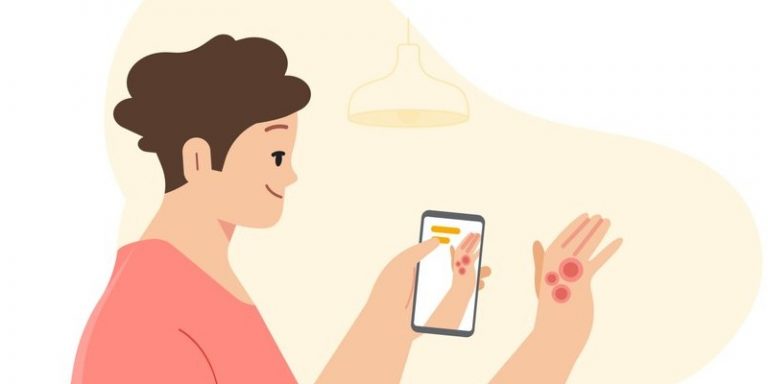
A few years ago, the University of Waterloo used artificial intelligence to help detect skin cancer. In the same vein, Google presented its work that resulted in the design of an app to detect skin diseases. The experts have developed a smartphone app using the camera for the AI to directly visualize the dermatological problem.
An application to help Google users better understand their skin problems
All of this work is based on an observation made by the Mountain View company: nearly ten billion searches for skin problems and diseases are conducted each year on their search engine. In addition, nearly two billion people in the world suffer from dermatological problems. Google also specifies that its users do not hesitate to ask about these concerns, but that the description of the problem is often not relevant.
Thus, the multinational company has embarked on the design of an AI-based dermatological assistance tool that aims to help users understand the potential skin problems they may have. In order to operate this tool, the patient must use their mobile phone and the camera included in it.
Use case: a dermatology tool based on artificial intelligence
The application proposed by the technology group exploits the camera of a smartphone: the user takes three photographs of the area of the skin, hair or nails where she considers to have a dermatological problem. After that, the user will be asked to answer several questions about their skin type, around the problem itself (pain, other symptoms, how long the problem has persisted, etc.).
The AI model designed by Google’s teams analyzes all the information and uses its knowledge to suggest one or more of the 288 possibilities it knows about so that the user can then do further research. For each possibility, the tool will display details from dermatologists as well as answers to the most frequently asked questions about the condition.
Google specifies that it is not a tool to provide a diagnosis or to substitute for medical advice since many of the possibilities proposed by the application require an examination by a specialist or additional tests. The system is only there to provide access to additional authoritative knowledge so that the user can make an informed decision such as the examination by a dermatologist.
Development of the AI model using deep learning
The development of this AI model was the subject ofa publication involving more than twenty specialists in artificial intelligence and health. This tool is the result of more than three years of research in machine learning, deep learning and product development.
The AI system presented above has been tested and could achieve accuracy comparable to that of certified US dermatologists. This is shown by this team in a second article where to improve their ability to interpret skin infections, non-specialist doctors can use AI-based tools.
The model proposed by the researchers was developed and refined using about 65,000 images and data of different cases all diagnosed, millions of images of skin problems and thousands of examples of holy skin in different locations around the world to take into account the factors of age, gender, ethnicity and different skin types.
The system that powers the app has passed clinical validation and the tool has been CE marked as a Class I medical device in the European Union. In the coming months, the experts hope that their app can be used by more people to answer questions about common skin problems.
Translated from Google souhaite vaincre les problèmes dermatologiques à l’aide de l’intelligence artificielle









